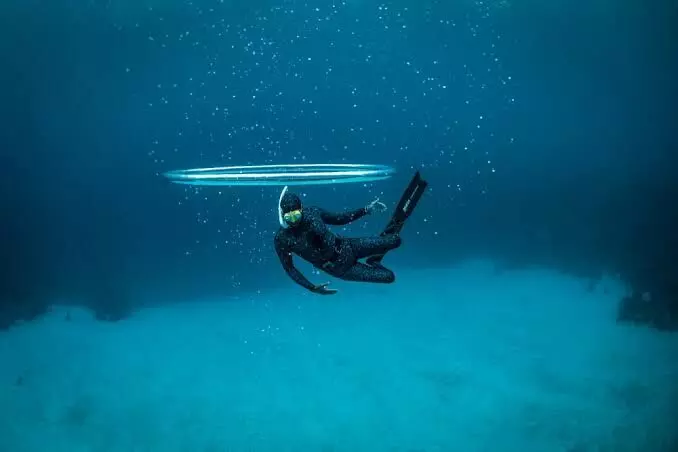World Ocean Day: Freediving offers mental relief for Indians seeking inner stillness
What began as an elite sport or adventure activity is now being embraced for its deeply therapeutic benefits
By Anoushka Caroline Williams
World Ocean Day: Freediving offers mental relief for Indians seeking inner stillness
Hyderabad: On World Ocean Day, we are reminded not just of the ocean’s ecological significance, but also of its power to heal.
While most conversations today focus on marine conservation and sustainability, a quieter revolution is taking place beneath the surface: freediving is emerging as a powerful mental health tool for urban Indians seeking stillness in a noisy world.
What began as an elite sport or adventure activity is now being embraced for its deeply therapeutic benefits—drawing professionals, creatives and even therapists toward the ocean, not for escape, but for reconnection.
What is freediving?
Freediving is the practice of diving underwater on a single breath, without the use of scuba gear. While it demands physical fitness and technique, many divers describe it as primarily a mental exercise—about letting go, slowing down, and being fully present.
“It’s not about how deep you can go, it’s about how calm you can be,” said Archana Sankara Narayanan, India’s national freediving record holder and a competitive athlete. “You don’t conquer the ocean. You surrender to it.”
The urban shift toward inner silence
With rising burnout, anxiety and screen dependency among young professionals in India’s metros, alternative therapies are seeing a steady uptick. Freediving offers something many find missing in city life: silence, stillness and a physical connection with nature.
“You’re not escaping when you dive. You’re arriving into a space where there is no noise, no rush, no one else but your breath,” explained Archana, who left her career as a corporate lawyer in Mumbai to pursue freediving full time.
Physiological reset underwater
Scientific studies have shown that freediving can induce a parasympathetic nervous system response—slowing heart rate, reducing blood pressure and triggering the mammalian dive reflex, which calms the body under stress.
“Being underwater changes the way the body responds to fear and anxiety,” said Dr Manish Mishra, a sports psychologist who has worked with open-water swimmers and divers. “When the breath is held consciously, the mind is forced to quieten. It’s somatic regulation at its most primal.”
Who is freediving in India?
Contrary to assumptions, the Indian freediving community is no longer limited to adventure tourists or professional athletes. Urban millennials, therapists, endurance runners, and even corporate teams are signing up for courses across coastal locations like Puducherry, Goa, and the Andamans.
“Half my students come for emotional reasons, not athletic ones,” said Ritesh Shankar, a freediving instructor based in Goa. “They come burnt out, anxious, or simply disconnected. Many are shocked by how emotional their first dive feels.”
Safety, training, and misconceptions
Despite its benefits, freediving is not without risks and should never be attempted without certified supervision. Training involves breathwork, safety drills and progressive depth work.
“There’s a misconception that freediving is dangerous. It’s not, if done responsibly,” says Ritesh. “We spend more time training people to listen to their bodies than pushing them to go deeper.”
A new form of therapy?
In India, where mental health stigma still lingers, freediving is quietly emerging as an alternative healing modality. Some therapists are now recommending it for clients dealing with anxiety, trauma, and grief.
“Freediving is meditative, embodied, and empowering,” says Dr. Manjula Rao, a clinical psychologist. “For clients who feel trapped in their minds, entering the ocean allows them to come back to their bodies—and to the present moment.”
The ocean as a mirror
For many divers, the ocean becomes more than just a setting—it becomes a mirror. Its unpredictability and depth force self-awareness, patience, and acceptance.
On this World Ocean Day, as we talk about saving the seas, it may be equally important to acknowledge how the seas, in return, might just be saving us.